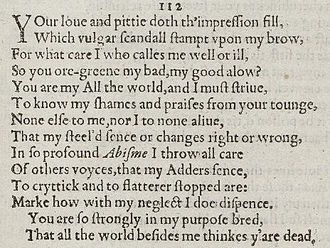Sonnet 112
Q1
Q2
Q3
C
Your love and pity doth the impression fill
Which vulgar scandal stamp’d upon my brow;
For what care I who calls me well or ill,
So you o’er-green my bad, my good allow?
You are my all the world, and I must strive
To know my shames and praises from your tongue;
None else to me, nor I to none alive,
That my steel’d sense or changes right or wrong.
In so profound abysm I throw all care
Of others’ voices, that my adder’s sense
To critic and to flatterer stopped are.
Mark how with my neglect I do dispense:
You are so strongly in my purpose bred
That all the world besides methinks are dead.
4
8
12
14
Sonnet 112 is one of 154 sonnets written by the English playwright and poet William Shakespeare. It is a member of the Fair Youth sequence, in which the poet expresses his love towards a young man. It is noted for its compressed and obscure language.
The youth's sympathy is such that it conceals the badge of shame on the poet's brow. No-one else's opinion matters, since the youth covers the poet's misdeeds. The poet must learn to take the youth's estimate as the only one worthwhile. All other opinions are consigned to oblivion. His rejection of the rest of the world is so complete that the rest of the world may as well be dead.
Sonnet 112 in part picks up the thought of Sonnet 111, about the friend's pity effacing his brand of shame; 'impression' recalls Lucrece lines 1763-4 'The face, that map which deep impression bears /Of hard misfortune, carved in it with tears.' Isabella connects 'impression' and 'shame' in Measure for Measure Act II scene iv. The shame in this poem could be vocational (the theatre, suggested by 111), or sexual.
'Vulgar scandal' is an idiom Shakespeare has in common with Fulke Greville. 'Vulgar' is used in Shakespeare to refer to the base, the common, the popular: the speech by Henry IV to Hal deplores Hal making himself 'stale and cheap to vulgar company', in a speech that turns on the proper decorum of how a person should relate to the multitude.
'O'er-greene': 'o'er' is Shakespeare's common abbreviation for 'over' in the sonnets, notable parallels in Sonnets 43, 65, 139 ('o'er worn; o'er-sways; o'er-pressed').
'You are my all the world': 'world' is quite a common term in the hyperbolic language of the sonnets (28 occurrences in the sequence. 'All the world' is enormously common in the writing of the period, 'my all the world' is unique to Shakespeare, and points up the simple romantic phrase in the midst of the difficult language of this poem.
...
Wikipedia

